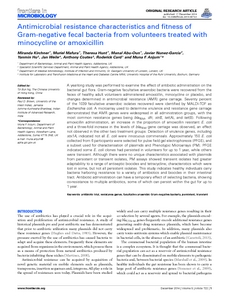Kirchner, M; Mafura, M; Hunt, T; Abu-Oun, M; Nunez-Garcia, J; Hu, Y; Weile, J; Coates, A; Card, R; Anjum, MF
(2014)
Antimicrobial resistance characteristics and fitness of Gram-negative fecal bacteria from volunteers treated with minocycline or amoxicillin.
Frontiers in Microbiology, 5 (722).
ISSN 1664-302X
https://doi.org/10.3389/fmicb.2014.00722
SGUL Authors: Coates, Anthony Robert Milnes Hu, Yanmin
![[img]](https://openaccess.sgul.ac.uk/107333/1.hassmallThumbnailVersion/Antimicrobial_resistance_characteristics_fitness_Gram_negative_fecal_bacteria.pdf)  Preview |
|
["document_typename_application/pdf; charset=binary" not defined]
Published Version
Download (861kB)
| Preview
|
Abstract
A yearlong study was performed to examine the effect of antibiotic administration on the bacterial gut flora. Gram-negative facultative anaerobic bacteria were recovered from the feces of healthy adult volunteers administered amoxicillin, minocycline or placebo, and changes determined in antimicrobial resistance (AMR) gene carriage. Seventy percent of the 1039 facultative anaerobic isolates recovered were identified by MALDI-TOF as Escherichia coli. A microarray used to determine virulence and resistance gene carriage demonstrated that AMR genes were widespread in all administration groups, with the most common resistance genes being bla TEM, dfr, strB, tet(A), and tet(B). Following amoxicillin administration, an increase in the proportion of amoxicillin resistant E. coli and a three-fold increase in the levels of bla TEM gene carriage was observed, an effect not observed in the other two treatment groups. Detection of virulence genes, including stx1A, indicated not all E. coli were innocuous commensals. Approximately 150 E. coli collected from 6 participants were selected for pulse field gel electrophoresis (PFGE), and a subset used for characterisation of plasmids and Phenotypic Microarrays (PM). PFGE indicated some E. coli clones had persisted in volunteers for up to 1 year, while others were transient. Although there were no unique characteristics associated with plasmids from persistent or transient isolates, PM assays showed transient isolates had greater adaptability to a range of antiseptic biocides and tetracycline; characteristics which were lost in some, but not all persistent isolates. This study indicates healthy individuals carry bacteria harboring resistance to a variety of antibiotics and biocides in their intestinal tract. Antibiotic administration can have a temporary effect of selecting bacteria, showing co-resistance to multiple antibiotics, some of which can persist within the gut for up to 1 year.
| Item Type: |
Article
|
| Additional Information: |
Copyright © 2014 Kirchner, Mafura, Hunt, Abu-Oun, Nunez-Garcia, Hu, Weile, Coates, Card and Anjum. This is an open-access article distributed under the terms of the Creative Commons Attribution License (CC BY). The use, distribution or reproduction in other forums is permitted, provided the original author(s) or licensor are credited and that the original publication in this journal is cited, in accordance with accepted academic practice. No use, distribution or reproduction is permitted which does not comply with these terms. |
| Keywords: |
antibiotic trial, facultative anaerobic Gram-negative bacteria, persistent, resistance genes, transient |
| SGUL Research Institute / Research Centre: |
Academic Structure > Infection and Immunity Research Institute (INII) |
| Journal or Publication Title: |
Frontiers in Microbiology |
| ISSN: |
1664-302X |
| Language: |
eng |
| PubMed ID: |
25566232 |
| Web of Science ID: |
WOS:000347260000001 |
| Dates: |
| Date |
Event |
| 2014-12-17 |
Published |
|
 |
Go to PubMed abstract |
| URI: |
https://openaccess.sgul.ac.uk/id/eprint/107333 |
| Publisher's version: |
https://doi.org/10.3389/fmicb.2014.00722 |
Statistics
Item downloaded times since 26 Feb 2015.
Actions (login required)
 |
Edit Item |



